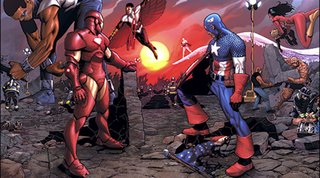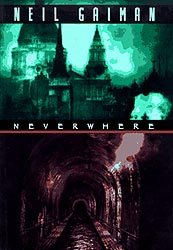
No, this isn't an essay about the circus that's Philippine partisan politics. It's a big joke that isn't worth writing about. This one's about a different kind of civil war. A more serious one.
Civil War is the latest seven-issue graphic novel crossover miniseries (I don't want to call it a "comic book" but I will explain that some other time) from Marvel.
The graphic novel starts out when a group of superheroes who star in a reality TV show called New Warriors decides to raid the hideout of a bunch of super villains in Stamford, Connecticut. The reckless bust led by Speedball turns awry and villain Nitro creates a huge blast that flattens a local school, killing 800 people, mostly schoolchildren.
This single incident served as the catalyst for changes that are expected to rock the Marvel Universe.
Public outrage against this incident boils and moves the government to propose an act to register all superheroes as living "weapons of mass destruction" (now where have I heard that term before?). This means superhero training, power evaluation, and accreditation. Oh, I almost forgot, there is also another minor glitch in this: the act also means revealing one's true identity. Ouch.
Expectedly, the superheroes are divided on this issue. A group led by Iron Man supports the registration act while a group led by Captain America opposes it. The others then begin to take sides and this is where the fun starts.
The graphic novel miniseries pits hero against hero as the villains, who temporarily take a backseat in the story, sneer in the sidelines.
Despite the seeming contrivedness of the plot, which is uncannily similar to X3's, it seems to work. I, for one, being a former Marvel fanatic in my younger years, am intrigued by the possible developments in the series. Who will join who? Who will kill who? Who will fight who? Who will betray who?
As of this writing, the series is only up to issue number three. A lot of things will still happen in the coming months. I don't even want to read spoilers about it on the Web, for fear of putting a damper on the whole thing.
I highly recommend Civil War, if only for the fact that it is the only real major event that has happened in the superhero graphic novel world in recent times (that may be arguable but I really don't think Spiderman's change of costume can be considered a momentous event, unless you're a fan of Fashion TV).
So whose side are you on?
As for me, I think that government regulations oftentimes suck. So I guess you know where I stand.


